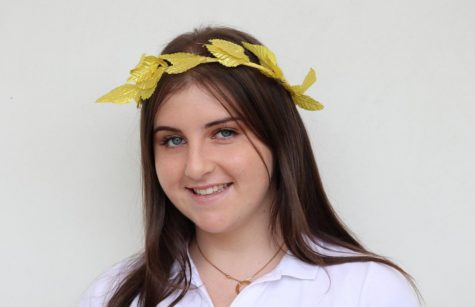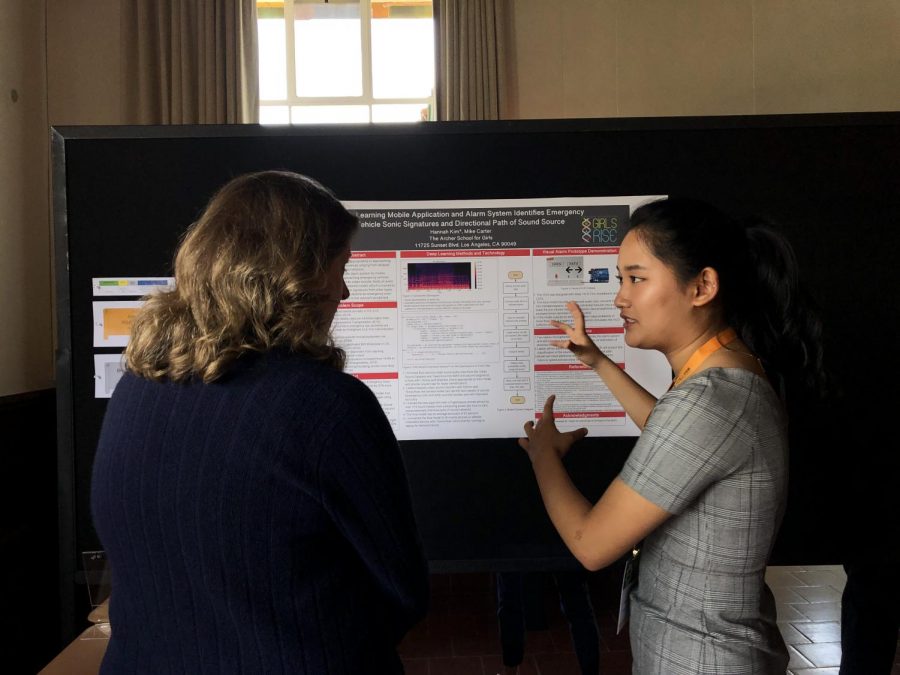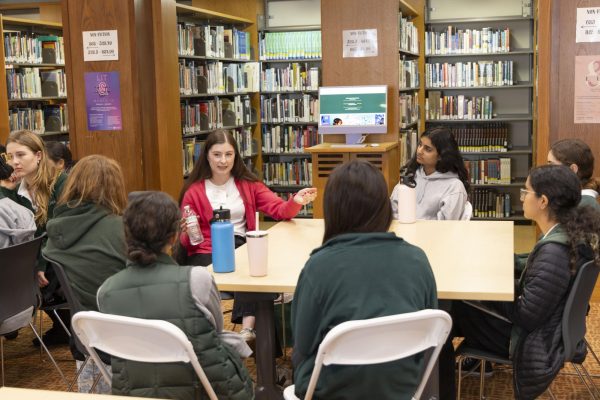Annual STEM Symposium ‘inspiring,’ ‘important’ experience
Photo credit: Nicki Rosenberg
Junior Hannah Kim presents her design for an artificial intelligence mobile application and alarm system that identifies an emergency vehicle’s siren. Annually, students present their research in the STEM fields at Archer’s STEM conference.
After a year of experimenting with fruit flies and learning how to code, students from four Los Angeles area high schools presented their research in the fields of molecular biology, chemistry, physics and engineering at Archer’s annual STEM Symposium on May 18. This year, the participants included students from Archer, Buckley, Granada Charter Hills High and Flintridge Sacred Heart Academy.
The event began with a presentation by keynote speaker Belinda Tan, a physician-scientist who co-founded Science 37, a telemedicine clinical research service that has raised over $100 million in venture capital with the mission to “accelerate biomedical research by putting the patient first.” The event continued with students presenting their research through posters, discussion and breakout sessions.
“I think it’s really important to showcase girls’ work in STEM,” junior Sophie Larbalestier, who presented at the symposium, said. “Women are under-represented in this field, and at Archer, we put a lot of emphasis on it, so when women are allowed to showcase their work, I think it’s really awesome to see everything come together and see people who are proud of their work.”
Throughout the day, students showcased their research on subjects ranging from a possible cure for xeroderma pigmentosum to the preventative effects of arthrospira platensis on Alzheimer’s.
“You can really tell that, through all of the projects, everyone wants to have an impact on bettering human life in some way,” Larbalestier said.
For example, junior Hannah Kim presented about an artificial intelligence mobile application and alarm system that identifies emergency vehicle sirens through frequency signatures from other urban sounds. Her work was inspired by personal experience.
“My dad and I were driving once, and my dad is a little hard of hearing, so he completely missed an emergency vehicle siren and it kind of swooped past us. But I was thinking at that moment, “What would’ve happened if we were in the wrong place at the wrong time?” Kim said. “[My device] can be used for hearing-impaired drivers or distracted drivers who may not be able to react appropriately.”
Although many students completed their research independently, Archer’s invention and product development class also presented their work at the conference. Throughout the school year, the group designed and created a displacement and disaster survival garment. Sophomore Rachael Azrialy said the class learned many skills; it spent four months learning how to sew. However, a primary takeaway was the importance of communication.
“Designing can be difficult and the sewing machines can be difficult, but one of the most difficult parts was communication,” Azrialy said. “The whole product attaches together and it’s all one thing, so as we were working on our individual pieces, we all had to communicate to make sure it did what it was supposed to.”
For many of the presenters, this had been their first year completing research. Through the process of forming their ideas and executing their experiments or designs, Larbalestier commented on how the student’s research taught them more than just scientific skills.
“I learned that if you hit a setback, you can’t just stop, you have to work with your teammates and figure it out,” Larbalestier said. “There’s always going to be bumps in the road, but you will get it done if you work hard enough.”
Along with presenting their work, students competed for the RISE award, which, according to science teacher Jerilyn Joel, was awarded to students for their “hard work” in their research. This year the winners of the Engineering and Technology Award were Annika Reff from Buckley and Hannah Kim from Archer, while the RISE Award winner was Constance Chiang from Granada Charter Hills High.
Regardless of whether or not they won an award, all students faced challenges while pursuing their research and, Kim highlighted that their “persistence” accumulates in an “inspiring” experience for all who attend the symposium.
“It’s so inspiring to see young people and girls who are pursuing such hard and advanced biology and engineering related projects,” Kim said. “It’s a really cool experience.”

Nicki Rosenberg joined the Oracle in 2017 and was then promoted to Managing Editor as a junior. This year she will continue serving as the Managing Editor...







![Faculty and students play in the Color Clash rematch March 20. Danilka Foranda-Zanipatin ('25) plays for the senior team. “Just to have some time deticated to just being supported by [a] large community… it’s just nice to have a little distraction.”](https://archeroracle.org/wp-content/uploads/2025/03/Screenshot-2025-03-20-at-4.12.21 PM-600x451.png)
